Where did the onion grief come from: why do we cry when we cut onions
Onions are among the most abundant vegetable crops on the planet. It is used not only in cooking, but also as a traditional medicine for colds.
Everyone who has ever “undressed” this multi-layered vegetable knows firsthand about “onion grief”. A scorching bow can knock out a tear from even the toughest men. Let's figure out why we cry when we cut onions, and what secrets are hidden for a long time known to the people spicy onions.
The content of the article
Description and history of the origin of onions
Onion is a genus of perennial and biennial plants of the Amaryllis family. (Amaryllidaceae) comprising over 900 different species. Among them, about 25 species are used for food, each of which includes up to 20 different varieties. There are also types of decorative bow, for example, the giant bow and the bow of Christoff.
Onions are used not only for food and decorative purposes, but also for obtaining medicines and dyes. There are wild poisonous species of this plant.
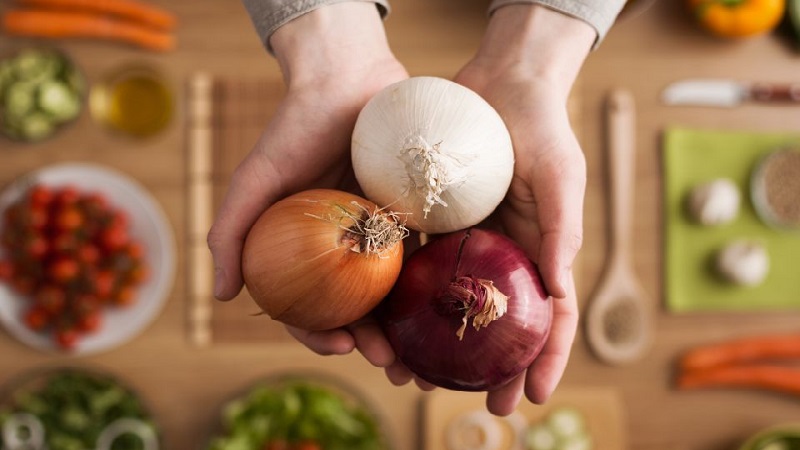
The first historical evidence of onion cultivation dates back to 4000 BC... This fragrant plant was popular in Ancient Greece, Ancient Rome, Egypt, India, Ancient China. Hippocrates, Aristotle, Paracelsus and other scientists and physicians of the past mentioned onions in their writings as a medicinal plant. Feathers and bulbs of the plant were used in religious ceremonies, it was believed that their pungent smell drives away evil spirits. The ancient Romans believed that tears from onions removed the bad spirit from the body.
Onions came to the territory of Russia in the XII-XIII centuries thanks to trade with the Byzantine state. Then the fragrant vegetable was used as a folk remedy, and protective amulets and amulets were made from it against damage, the evil eye and evil spirits. From the banks of the Danube River, different types of onions spread throughout the entire territory of the ancient Russian state.
On the territory of Russia, the species Onion is widespread (Allium cepa), which is used as a hot seasoning for soups, side dishes, salads, meat and fish dishes.
It can be useful:
Onion hair masks for hair loss treatment
The chemical composition of the bulbs
Scientists of antiquity considered onions a valuable medicinal raw material for a reason. The juicy pulp of onions contains a number of useful vitamins and minerals.
| Biologically active nutrient | Quantity in 100 g of fresh onion pulp | % of the recommended daily intake |
| Vitamin E | 0.2 mg | 1% |
| Vitamin C | 10 mg | 11% |
| Vitamin B1 | 0.05 mg | 3% |
| Vitamin B2 | 0.02 mg | 1% |
| Vitamin B5 | 0.1 mg | 2% |
| Vitamin B6 | 0.12 mg | 6% |
| Vitami H | 0.9 μg | 2% |
| Vitamin PP | 0.7 mg | 4% |
| Vitamin B9 | 9 μg | 2% |
| Potassium | 175 mg | 7% |
| Calcium | 31 mg | 3% |
| Magnesium | 14 mg | 4% |
| Sodium | 4 mg | 0% |
| Sulfur | 65 mg | — |
| Phosphorus | 58 mg | 7% |
| Chlorine | 25 mg | 1% |
| Boron | 200 mcg | — |
| Iron | 0.8 mg | 4% |
| Iodine | 3 μg | 2% |
| Cobalt | 5 μg | 50% |
| Manganese | 0.23 mg | 12% |
| Copper | 0.09 mg | 9% |
| Fluorine | 31 mcg | 1% |
| Chromium | 2 μg | 4% |
| Zinc | 0.85 mg | 7% |
In addition to biologically active components, onion pulp contains 3 g dietary fiber, 8.2 g carbohydrates, 0.2 g fat and 1.4 g protein.
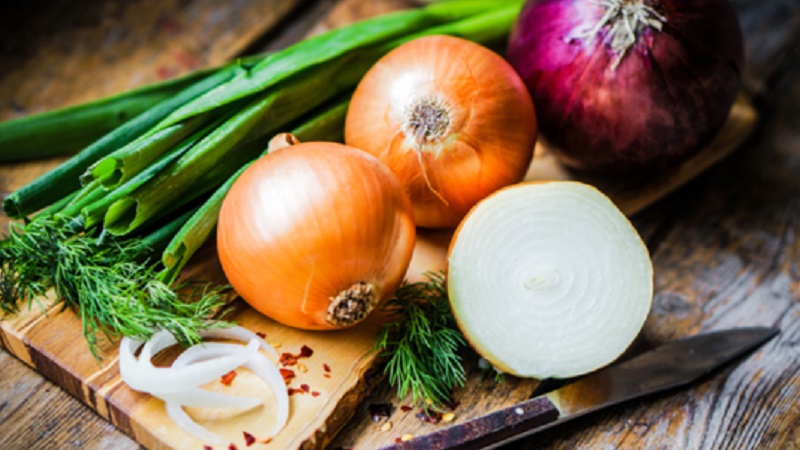
The reason for tearing when slicing onions
Protein is the reason why we cry when we cut onions... The structural components of proteins - amino acids - are always present in the cell sap, of which cysteine and methionine contain sulfur in the chemical structure.
When the integrity of the cell membrane is violated, a number of intracellular enzymatic reactions are triggered, as a result of which 1-propenesulfenic acid is formed from sulfur-containing amino acids. This acid is converted to 1-sulfinylpropane, a volatile unstable compound called a lacrimator.When the lacrimator reacts with water on the surface of the mucous membrane of the eyes, nose or mouth, sulfur-containing acids and disulfides are formed, which cause irritation and burning.
The paradox of "onion grief" is that tear fluid is reflexively released when the mucous membrane of the eyes is irritated, but the more tears, the more fluid and more disulfides from 1-sulfinylpropane are formed, and the more watery eyes. This biochemical mechanism was developed by the plant during evolution to protect it from being eaten by animals.
Small amounts of disulfides formed in the mouth when fresh onions are consumed give this vegetable a pungency and pungency., which stimulates appetite and gastric secretion.
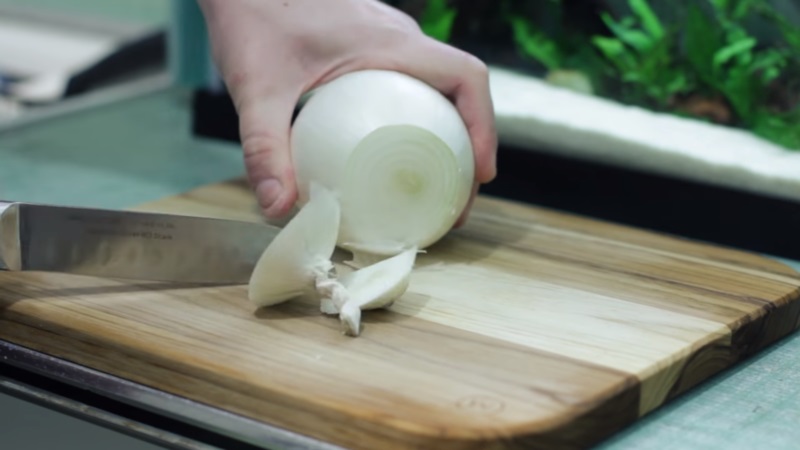
Potential Dangers and Precautions for Slicing Onions
Under the action of the lacrimator on mucous membranes, an insufficient amount of sulfur-containing acids and disulfides is releasedto harm human health. The amount of acid formed is negligible (less than 0.01%), while the lacrimal fluid contains neutralizing substances that protect the eyes from aggressive environments.
A few minutes after contact with the volatile substances of the onion juice, the normal pH of the tear fluid is restored, but it hurts the eyes for a while even after washing. The severity of pain is individual and depends on the degree of sensitivity. The eye membranes and mucous membranes from onions cannot be affected if there is no individual intolerance or allergies.
In case of allergy, intolerance or hypersensitivity take precautions when slicing onions:
- Use safety goggles and a gauze bandage dampened with water to protect the mucous membranes of the eyes, nose and mouth from volatiles.
- Ventilate the room.
- After slicing, thoroughly wash your hands, knife and cutting board.
In case of contact with drops of onion juice on the sensitive mucous membranes of the nasal cavity, it is washed with 1% baking soda solution. In case of contact with eyes, they are washed with ordinary running water. If an immediate allergic reaction develops - anaphylactic shock, laryngeal edema with blockage of the airways, immediately call an ambulance.
Read also:
Scientific research "onion grief"
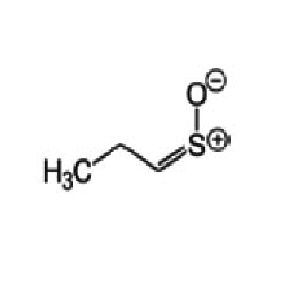 The chemical composition of the tear substance released when slicing onions was studied by the American chemist from Texas Eric Block, wondering why people cry from onions. During his experiments, Block faced the difficulty of determining the chemical composition of the lacrimator., since 1-sulfinylpropane is unstable and decomposes instantly in water. Eric Block also discovered which acid is formed in onions as a precursor of 1-sulfinylpropane.
The chemical composition of the tear substance released when slicing onions was studied by the American chemist from Texas Eric Block, wondering why people cry from onions. During his experiments, Block faced the difficulty of determining the chemical composition of the lacrimator., since 1-sulfinylpropane is unstable and decomposes instantly in water. Eric Block also discovered which acid is formed in onions as a precursor of 1-sulfinylpropane.
Scientists from Case Western University in Ohio have determined the structure of an enzyme that triggers the process of lacrimator synthesis in bulb cells. Thanks to this research, Japanese breeders, together with colleagues from New Zealand, have developed an onion variety without the lacrimogenic enzyme, which can be cut without crying. It is noteworthy that such an onion not only does not cause lacrimation, but also does not have a characteristic pungent odor and bitterness.
The mechanism of formation of the lacrimator and the complete chain of chemical transformations occurring in onion cells during damage to the membranes were studied by Duane Mellor, a senior lecturer at Coventry University in the UK. The scientist notes that not all types of onions cause tearing during cutting, and the pungency of the bulbs depends on the amount of sulfur absorbed by the vegetable from the soil. Therefore, on soils rich in salts of sulfur-containing compounds, the most burning and "evil" onions grow.
Duane Mellor, in his study based on the study of different varieties of onions, concluded that Sweet, red salad varieties contain less sulfur compounds than classic white onions and are therefore less irritating to the eyes when slicing.
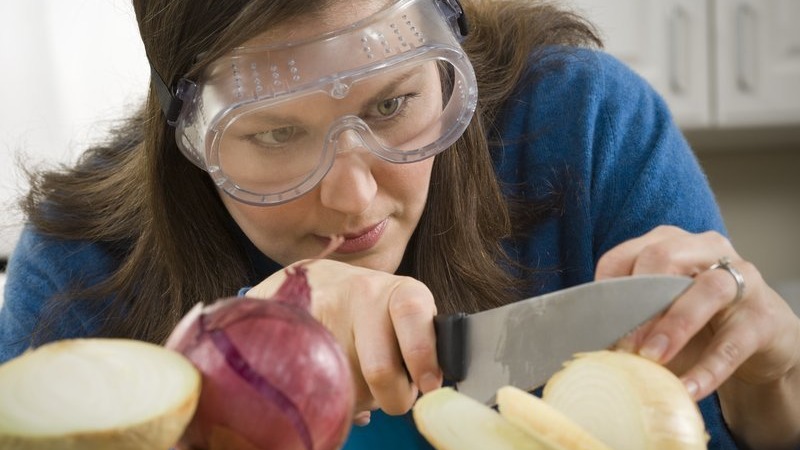
Sensitivity to onion lacrimation
Why doesn't the bow make everyone's eyes sting? The reason lies in the individual characteristics of the structure of the visual apparatus.... Statistically, men have fewer receptors on the surface of the skin and mucous membranes, so they can more easily tolerate irritation when cutting bulbs. The older the person, the thicker the surface of the epithelium of the mucous membranes and the lower the sensitivity to irritating factors.
The response to onion lacrimator varies with various eye conditions... With keratoconjunctivitis dry, called dry eye syndrome, the sensitivity to the sulfur compounds of onion juice decreases sharply until it disappears completely. In inflammatory and infectious processes, on the contrary, there is an increased release of lacrimal fluid in response to substances-lacrimators.
How to cut onions without tears
In addition to using goggles and a gauze bandage, experienced chefs recommend using the following simple life hacks for slicing onions:
- Use a sharp knife. If the knife is not sharpened enough, the cells of the bulb are crushed, more onion juice and more lacrimator are released.
- Soak the bulbs in cold water for half an hour. Water breaks down the sulfur-containing lacrimator, so less is produced when slicing.
- Moisten the knife with water while slicing. The principle of this life hack is the same as in the previous paragraph: water decomposes 1-sulfinylpropane. The more contact of the bulb with water, the less tears.
- Chop the onion under the hood or fan. The directional airflow will reduce the concentration of volatile compounds in the air.
- Do not cut the onion to the root. More sulfur compounds accumulate at the base of the bulb, so this part causes more watery eyes.
Practice shows that some popular ways to reduce lacrimation when cutting onions are ineffective:
- take water into your mouth when cutting;
- grease the board with lemon juice or sprinkle with salt;
- light a candle next to the cutting board;
- plug the nostrils with cotton;
- speak or sing while slicing.
Using a scientific approach, rather than old beliefs, can reduce discomfort to a minimum when cooking your favorite dishes with onions.
Conclusion
To cause tears in those who decided to "add the onion" is a plant's defense mechanism developed in the process of evolution. The cause of watery eyes during slicing of onions is the lacrimator substance 1-sulfinylpropane, which is produced from cysteine and methionine during enzymatic reactions.
The lacrimator is decomposed by water on the surface of the mucous membrane of the eyes with the formation of a small amount of sulfur-containing acids. These compounds are instantly neutralized by the components of the tear fluid, without harming health, but disturbing the pH that is comfortable for the eyes.
To enjoy your favorite dishes, use a sharp knife, soak the onions in water before slicing, work under a fume hood, and do not cut the onions to the root. If you are intolerant or allergic to onions, use personal eye and respiratory protection.